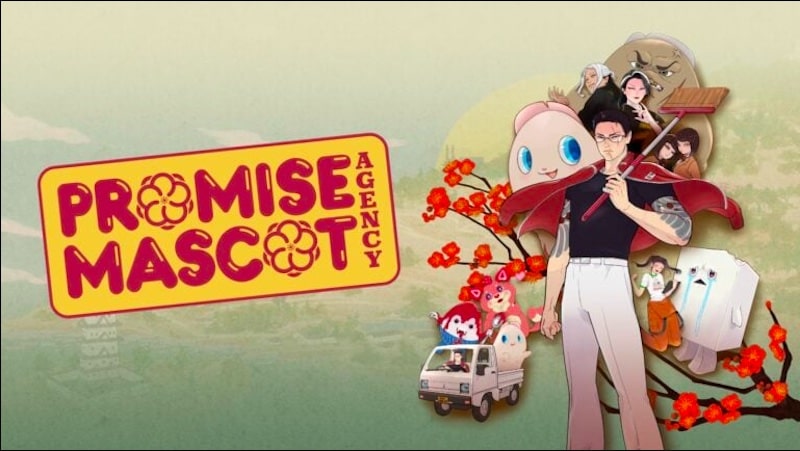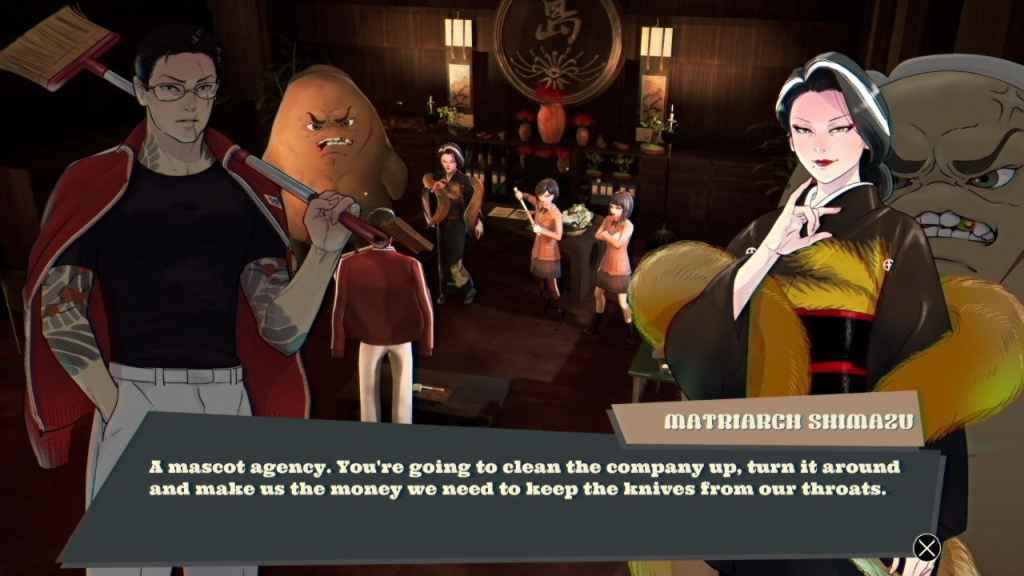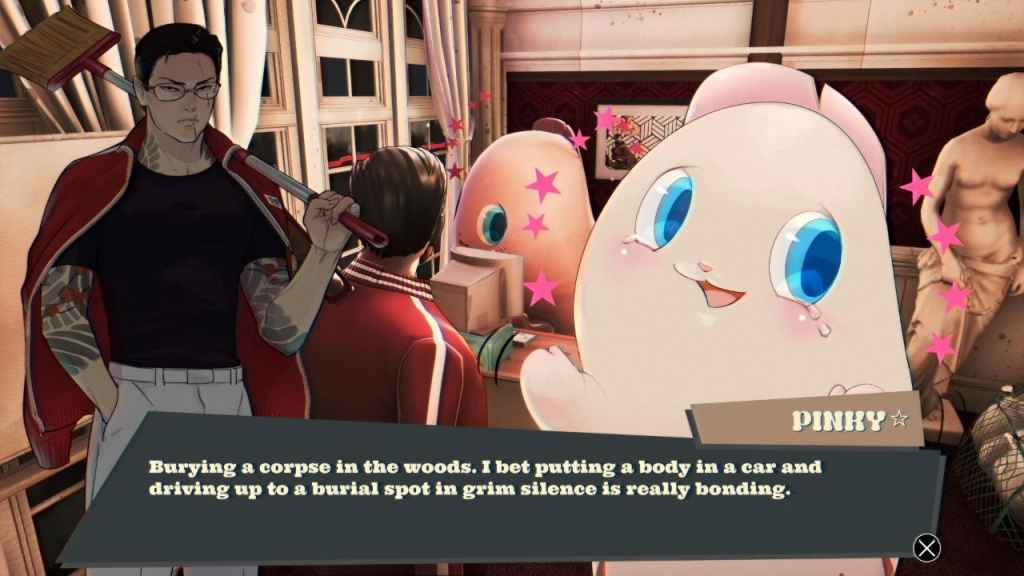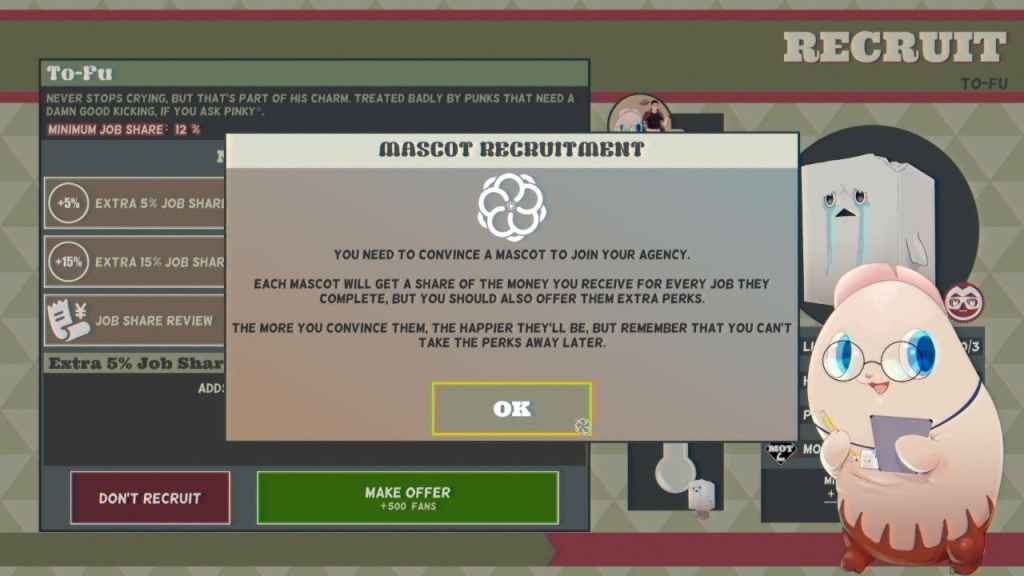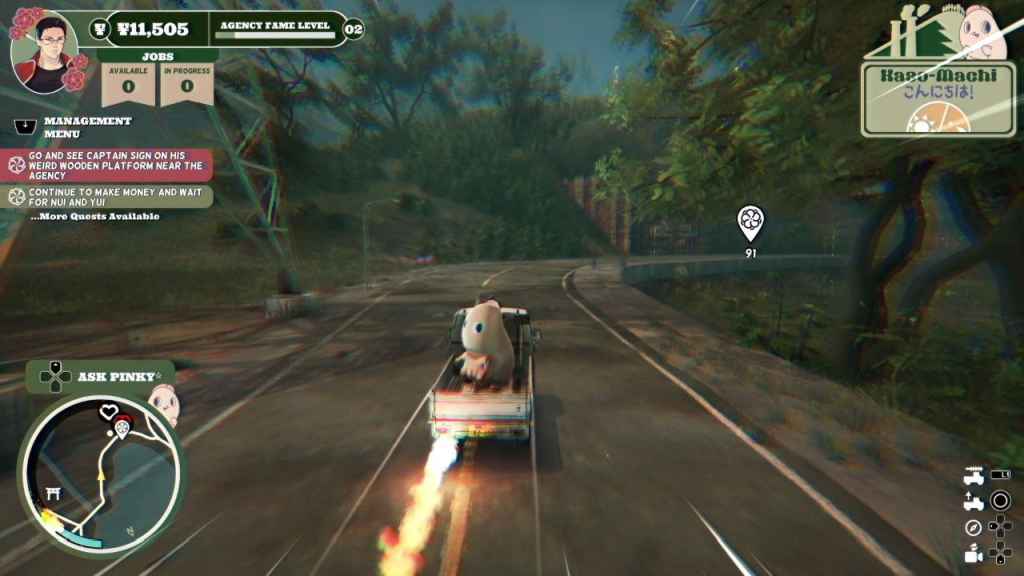Promise Mascot Agency PS5 Review. Putting all my cards on the table, Promise Mascot Agency is one of the most earnestly offbeat games that I’ve ever played. For a concept as absurd as running an agency of living mascots against the backdrop of a yakuza drama, Promise Mascot Agency manages to deliver a genuinely entertaining time that gripped me from beginning to end.
I had my reservations going in – in particular worrying about the ways that Promise Mascot Agency would handle the amount of moving parts across both narrative and gameplay. I thought it would be too much to handle, but I was proven delightfully wrong.
At its core, Promise Mascot Agency knows what it is and embraces itself with just enough self-awareness to be funny, but still takes itself seriously where it counts —one of the indie highlights of the year so far.
Promise Mascot Agency Review (PS5) – An Earnest Living
Mascot Mayhem
From the outside looking in, you would immediately think of Promise Mascot Agency as nothing other than a quirky simulator adjacent game. The titular ‘mascots’ are front and center of the title screen and you’d be forgiven for thinking that the game wasn’t holding much beyond that.
So imagine my surprise when the game opens on a lengthy worldbuilding segment all about the ongoing conflict between yakuza families in Japan and the explosion of conflict between two clans. Protagonist Michi essentially sends himself into exile as a consequence of a single choice and is tasked with making money to cover for an obscene loss.
Even though this happens within the first hour, I would hate to take away from the experience of seeing everything unfold in front of you. In a refreshing change of pace, no time is wasted trying to rationalise the presence of walking mascots. They simply exist, and do so alongside humans in pretty grounded scenarios. Part of me found it slightly jarring, but I appreciated the fact that I wasn’t walking down the route of overexplanation and taking the whimsy out of the clash. The fact that a walking block of Tofu just exists is far funnier than trying to explain it.
In some ways, it borrows the tonal whiplash from series like Like a Dragon in both gameplay and narrative. The inspiration is as clear as day, but that doesn’t mean that Promise Mascot Agency is by any means derivative. This is its own beast, very much coming out of the same tonal cloth.
Get Behind the Wheel
Much of Promise Mascot Agency is spent driving. And I loved it. In another aspect of design that veers away from a more grounded nature, your trusty truck is able to just about do anything and withstand any kind of impact that you throw at it. You won’t ever be punished for being slightly unconventional in your driving style.
Why should you be? You’ve got a giant finger with a face on it sat in your boot – where should they draw the line?
As you navigate from quest marker to quest marker, you’ll steadily unlock collectables to hunt across the island that all help you with the main mission of successfully running a profitable mascot business. This does eventually tie back into the Yakuza plot, but I truthfully just enjoyed pottering around and seeing what this charming yet run-down Japanese town had to offer.
You get the impression that there’s a bit more going on than meets the eye, but you’re allowed to take it slowly and explore to your leisure. Hunting down hero cards to help you on jobs, chasing spirit foxes to upgrade your truck’s performance, it all feels strangely cozy, and I enjoyed just wandering.
My only reservation comes from how I wish some of these systems did marry together a little bit more seamlessly. I sometimes felt like the offbeat driving mechanics clashed with the simulator and deck-builder elements to make for an experience that felt closer to two games mashed together, rather than one or the other. I like both and I think both are realised well, but seeing these two come together a bit more seamlessly would have been the icing on the cake.
Exploring the town and discovering another weird mascot to bring under your wing never got tiring, though.
Bursting with Character
As a native English speaker, my familiarity with Japanese voice talent isn’t quite as robust as some others. Whether it comes down to not being able to understand them without subtitles, or the nuances of performance, I usually take Japanese performances as they come. I can certainly tell quality when I hear it, and Promise Mascot Agency is bursting with it.
But it says something when a voice actor can transcend that language barrier and become something that much more universal. So when you hear Michi’s voice at the start of the game, you might find yourself pleasantly surprised to hear Takaya Kuroda taking up the lead, famous for his generational performances in the Like a Dragon series. Already a clear inspiration for this game, the inclusion of Kuroda brings that reverence full circle into something truly special.
That isn’t to reduce Kuroda into just one defining role, or to even say that the other performances aren’t similarly great. Each vocal performance is full of bubbly energy and really manages to tow the line between silly and genuinely heartfelt when the time calls for it. Cameos from industry legends like Shuhei Yoshida and Swery are also brilliant surprises and show the team’s reverence for the space as a whole. I was shocked when I learnt that the team behind Promise Mascot Agency were British – it feels that in touch with what its presenting.
Beyond just the voice acting, these characters are given razor-sharp lines to work with; each line of dialogue feels strong and incredibly funny. If you’ve got a taste for Like a Dragon, you’ll feel at home with the style of storytelling here. I really can’t undersell just how much of a tall order it is to be able to write compelling characters when some of them are literal pinkie fingers, but it somehow makes the mark.
Spinning the Plates
Where the ‘mascots’ of Promise Mascot Agency come into their own is with the jobs that you take on as you explore the town and meet its residents. You’ll steadily grow your catalogue of available mascots, each with strengths, weaknesses and needs to consider as you send them out on jobs.
When you hire one, you’ll have to consider the amount of money that they make out of a job. What their holiday privileges are and the type of other bonuses you can offer to sweeten the deal. While adding an extra wrinkle to consider, I never really found that I was incentivised to tinker with it as much as I would have liked.
Your job as Michi is to manage the whole operation, rather than doing the actual job. You’ll send mascots on jobs, and you’ll be alerted if (and inevitably, when) something is going wrong and you might want to consider sending help. While you can ignore these summons and carry on with your own upgrades and improvements of the company, you’re encouraged to jump in and try to assist.
This is done through the use of Hero Cards, which are collectables spread out across a variety of characters in town. Each one offers a unique attribute that is useful for various scenarios. One character may be more useful in a scenario to do with poorly stacked boxes, where another might be able to deal with spontaneous bee swarms.
While I don’t imagine this will be a deck builder that will light the world on fire, the inclusion adds a layer of interactivity that would otherwise be missing, which is appreciated. I would have loved to have seen this aspect of the game explored a bit further, because I feel like there’s almost the potential for an entirely separate game here.
Authentic, Down To The Smallest Details
Promise Mascot Agency is clear about its inspirations, and this runs all the way down to the very presentation of the game itself. You’re prompted to immerse yourself in visual filters and flourishes in order to create an atmosphere unlike any other.
Driving around Kaso-Machi in the twilight hours with some wonderfully low-key music and fun driving controls was when I felt like Promise Mascot Agency really came into its stride. I had questions about the direction the game was taking early on, but it miraculously felt like it came together.
Before long, Kaso-Machi felt like somewhere I could know off of the back of my hand. A timeless space that never felt too entrenched in either past nor present. The big risk of pivoting games around modern concepts like “livestreams” is that they can feel corporate or appealing to a demographic for the sake of identifying words that they recognise.
The construction of Kaso-Machi proves to me that this isn’t the case. It melds the modern world with a town seemingly stuck behind the curve of gentrification.
Strong aesthetics make what is already a unique concept into something that can’t be overlooked; Promise Mascot Agency is acutely aware of where it needs to go in order to stand out and manages to succeed itself wherever possible.
